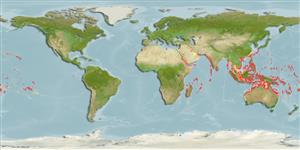Teleostei (teleosts) >
Holocentriformes (Squirrelfishes, soldierfishes) >
Holocentridae (Squirrelfishes, soldierfishes) > Holocentrinae
Etymology: Neoniphon: Greek, neos = new + Greek, niphon = to snow (Ref. 45335).
Environment: milieu / climate zone / depth range / distribution range
Ecology
Marine; reef-associated; depth range 0 - 46 m (Ref. 9710). Tropical; 30°N - 32°S, 31°E - 123°W
Indo-Pacific: Red Sea and East Africa to the Marquesan and Ducie islands, north to southern Japan, the Ogasawara and Hawaiian islands, south to northern Australia and Lord Howe Island.
Length at first maturity / Size / Weight / Age
Maturity: Lm 15.0 range ? - ? cm
Max length : 32.0 cm TL male/unsexed; (Ref. 9710); common length : 23.0 cm TL male/unsexed; (Ref. 9948)
Dorsal spines (total): 11; Dorsal soft rays (total): 11 - 13; Anal spines: 4; Anal soft rays: 7 - 8. Pinkish silvery above, silvery below; a dark red to black spot on each scale. Reddish stripe along LL (Ref. 4201). Outer margin of caudal lobes and anterior soft rays of dorsal and anal fins reddish; pectoral fins pale pink, pelvic fins white (Ref. 4201).
This schooling species inhabits seagrass beds and hard-bottomed habitats from the reef flat to depths of 46 m or more on lagoon and seaward reefs. Often found with branching Acropora coral (Ref. 9710). Most common Neophion found in shallow areas (Ref. 9710). Benthopelagic (Ref. 58302). Feeds on small fishes (Ref. 30573), small crabs, and shrimps at night. Venomous spine at the corner of its preopercle. Marketed fresh (Ref. 9948). Solitary (Ref 90102).
Life cycle and mating behavior
Maturity | Reproduction | Spawning | Eggs | Fecundity | Larvae
Randall, J.E. and P.C. Heemstra, 1986. Holocentridae. p. 415-427. In M.M. Smith and P.C. Heemstra (eds.) Smiths' sea fishes. Springer-Verlag, Berlin. (Ref. 4201)
IUCN Red List Status (Ref. 130435: Version 2024-1)
Human uses
Fisheries: minor commercial; aquarium: commercial; bait: usually
Tools
Special reports
Download XML
Internet sources
Estimates based on models
Preferred temperature (Ref.
123201): 24.7 - 29, mean 27.9 °C (based on 954 cells).
Phylogenetic diversity index (Ref.
82804): PD
50 = 0.5312 [Uniqueness, from 0.5 = low to 2.0 = high].
Bayesian length-weight: a=0.01622 (0.01329 - 0.01979), b=2.96 (2.90 - 3.02), in cm total length, based on LWR estimates for this species (Ref.
93245).
Trophic level (Ref.
69278): 3.6 ±0.2 se; based on diet studies.
Generation time: 3.9 ( na - na) years. Estimated as median ln(3)/K based on 2
growth studies.
Resilience (Ref.
120179): High, minimum population doubling time less than 15 months (K=0.5).
Fishing Vulnerability (Ref.
59153): Low to moderate vulnerability (26 of 100).
Nutrients (Ref.
124155): Calcium = 52.1 [24.2, 156.6] mg/100g; Iron = 0.62 [0.26, 1.24] mg/100g; Protein = 18.6 [17.5, 19.8] %; Omega3 = 0.157 [0.065, 0.357] g/100g; Selenium = 32.8 [20.6, 58.8] μg/100g; VitaminA = 75.4 [30.1, 192.0] μg/100g; Zinc = 1.21 [0.80, 1.83] mg/100g (wet weight);
